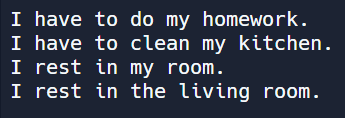반응형

[자바기초.017] super 키워드
[1] super 키워드
- subclass는 superclass로부터 상속받은 필드와 메소드를 사용할 수 있습니다.
- 그런데 subclass가 superclass의 메소드를 재정의 해서 사용하는 "오버라이드(override)"를 했다고 가정했을 때,
- 만약 superclass의 override된 메소드를 사용하고 싶다면 어떻게 해야 할까요?
- 이럴 때 바로 super.method()로 superclass의 메소드를 실행할 수 있습니다.
[2] super의 2가지 쓰임새
- super() / super(arguments): superclass의 생성자(constructor)를 subclass의 생성자 첫 줄에서 실행할 때 사용.
- super.method() : superclass의 메소드(method)를 사용할 때(not constructors) .
The keyword super is very useful in allowing us to first execute the superclass method and then add on to it in the subclass.
[예제1] 아래 예제 코드를 보고 super.method()의 쓰임새를 살펴 봅시다.
1 2 3 4 5 6 7 8 9 10 11 12 13 14 15 16 17 18 19 20 21 22 23 24 25 26 27 28 29 30 31 32 33 34 35 36 37 38 39 40 41 | class Person { private String name = null; public Person(String theName) { name = theName; } public String getFood() { return "Hamburger"; } } class Student extends Person { private int id; private static int nextId = 0; public Student(String theName) { super(theName); id = nextId; nextId++; } public String getFood() { String output = super.getFood(); return output + " and Pizza"; } public int getId() { return this.id; } public void setId(int theId) { this.id = theId; } } public class Main { public static void main(String[] args) { Student p = new Student("Javier"); System.out.println(p.getFood()); } } | cs |
- Student 클래스는 Person 클래스의 상속을 받는다.
- Student 클래스의 getFood() 메소드는 superclass의 메소드를 오버라이드 한 것이다.
- 그래서 subclass에서 superclass의 getFodd() 메소드를 사용하기 위해 super.getFood() 메소드를 사용했다.
[유제1] 아래의 영어로 된 조건문을 읽어보고 아래 코드에 추가로 코딩해 보세요.
| <조건> 1.Add another subclass called Vegan that inherits from the Student class. 2.Add a Vegan contructor that takes a name as an argument and passes it to the super constructor. 3.Override the getFood() method in Vegan to call the superclass getFood() but add a “No “ in front of it and then say “but “ and add a vegan food. 4.Change Javier to a Vegan object in main() and try it out! |
1 2 3 4 5 6 7 8 9 10 11 12 13 14 15 16 17 18 19 20 21 22 23 24 25 26 27 28 29 30 31 32 33 34 35 36 37 38 39 40 41 | class Person { private String name = null; public Person(String theName) { name = theName; } public String getFood() { return "Hamburger"; } } class Student extends Person { private int id; private static int nextId = 0; public Student(String theName) { super(theName); id = nextId; nextId++; } public String getFood() { String output = super.getFood(); return output + " and Pizza"; } public int getId() { return this.id; } public void setId(int theId) { this.id = theId; } } public class Main { public static void main(String[] args) { Student p = new Student("Javier"); System.out.println(p.getFood()); } } | cs |
[예제2] 아래 코드를 보며, subclass와 superclass 간의 메소드 실행 순서에 대해 알아보자.
1 2 3 4 5 6 7 8 9 10 11 12 13 14 15 16 17 18 19 20 21 22 23 24 25 26 27 28 29 30 31 32 33 34 35 | class Parent { public void work() { System.out.println("I have to clean my kitchen."); rest(); // 이 부분이 중요! (subclass? superclass?) } public void rest() { System.out.println("I rest in the living room."); } } class Child extends Parent { @Override public void work() { System.out.println("I have to do my homework."); super.work(); } @Override public void rest() { System.out.println("I rest in my room."); super.rest(); } } public class Main { public static void main(String[] args) { Parent ch = new Child(); ch.work(); } } | cs |
[실행결과]

- 위 코드에서 Parent ch = new Child() 부분이 실행된다.
- ch는 Parent 변수로 되어 있지만, Child 생성자로 만든거라서 엄연히 Child 클래스의 Object이다.
- 그래서 ch.work() 실행하면 Child 클래스의 work 메소드(아래)가 실행된다.
@Override
public void work()
{
System.out.println("I have to do my homework.");
super.work();
}- 이후에 super.work()를 실행하면 superclass(Parent 클래스)의 work() 메소드가 실행된다.
public void work()
{
System.out.println("I have to clean my kitchen.");
rest(); // 이 부분이 중요! (subclass? superclass?)
}- 이후에 rest() 가 실행될 때가 중요하다. ch는 Child의 object이므로 rest()는 Child의 rest() 메소드(아래)가 실행된다.
@Override
public void rest()
{
System.out.println("I rest in my room.");
super.rest();
}- 이후에 super.rest()는 superclass(Parent 클래스)의 rest() 메소드가 실행되고 완료된다.
[참고]
위 코드의 실행순서를 잘 이해하는 데에 도움이 되는 "자바 비주얼 디버거"라는 아래의 사이트를 이용해 보자.
-링크: https://cscircles.cemc.uwaterloo.ca/java_visualize/#

[유제2] 아래 코드의 실행결과를 말해보세요.
1 2 3 4 5 6 7 8 9 10 11 12 13 14 15 16 17 18 19 20 21 22 23 24 25 26 27 28 29 30 31 32 33 34 | class Base { public void methodOne() { System.out.print("A"); methodTwo(); } public void methodTwo() { System.out.print("B"); } } class Derived extends Base { public void methodOne() { super.methodOne(); System.out.print("C"); } public void methodTwo() { super.methodTwo(); System.out.print("D"); } } public class Main { public static void main(String[] args) { Base b = new Derived(); b.methodOne(); } } | cs |
[유제3] 아래의 영문으로 된 조건에 맞는 코딩을 하세요.
1 2 3 4 5 6 7 8 9 10 11 12 13 14 15 16 17 18 19 20 21 22 23 24 25 26 27 28 29 30 31 32 33 34 35 | class Customer { private String name; private String address; public Customer(String n, String a) { name = n; address = a; } public String toString() { return "Name: " + name + "\nAddress: " + address; } } // 1.Complete the OnlineCustomer class to inherit from Customer // 2.It should have an email attribute, // 3.a constructor with 3 arguments (name, address, email) that uses the super // constructor, // 4.and an overridden toString() method that calls the super toString() method // and then prints "\nEmail:" and the email variable. public class Main { public static void main(String[] args) { Customer c = new Customer("Fran Santiago", "123 Main St., Anytown, USA"); System.out.println(c); // 5.Uncomment these to test OnlineCustomer // OnlineCustomer c2 = new OnlineCustomer("Jasper Smith", // "456 High St., Anytown, USA", "jsmith456@gmail.com"); // System.out.println(c2); } } | cs |
[3] 요약
- super 키워드는 superclass 생성자(constructor)와 메소드(method)를 실행시키는 데에 사용된다.
- superclass의 메소드는 subclass에서 super.method()에 의해 실행될 수 있다.
[유제 정답은 아래 "더보기" 클릭]
더보기

[유제1 정답]
1 2 3 4 5 6 7 8 9 10 11 12 13 14 15 16 17 18 19 20 21 22 23 24 25 26 27 28 29 30 31 32 33 34 35 36 37 38 39 40 41 42 43 44 45 46 47 48 49 50 51 52 53 54 55 | class Person { private String name = null; public Person(String theName) { name = theName; } public String getFood() { return "Hamburger"; } } class Student extends Person { private int id; private static int nextId = 0; public Student(String theName) { super(theName); id = nextId; nextId++; } public String getFood() { String output = super.getFood(); return output + " and Pizza"; } public int getId() { return this.id; } public void setId(int theId) { this.id = theId; } } class Vegan extends Student { public Vegan(String name) { super(name); } @Override public String getFood() { String output = super.getFood(); return "No," + output + " but Tomato."; } } public class Main { public static void main(String[] args) { Student p = new Student("Javier"); System.out.println(p.getFood()); Vegan v = new Vegan("Tom"); System.out.println(v.getFood()); } } | cs |
[유제2 정답]

[유제3 정답]
1 2 3 4 5 6 7 8 9 10 11 12 13 14 15 16 17 18 19 20 21 22 23 24 25 26 27 28 29 30 31 32 33 34 35 36 37 38 39 40 41 42 43 44 45 46 47 48 49 50 | class Customer { private String name; private String address; public Customer(String n, String a) { name = n; address = a; } public String toString() { return "Name: " + name + "\nAddress: " + address; } } // 1.Complete the OnlineCustomer class to inherit from Customer // 2.It should have an email attribute, // 3.a constructor with 3 arguments (name, address, email) that uses the super // constructor, // 4.and an overridden toString() method that calls the super toString() method // and then prints "\nEmail:" and the email variable. class OnlineCustomer extends Customer { private String email; public OnlineCustomer(String name, String address, String email) { super(name, address); this.email = email; } @Override public String toString() { return super.toString() + "\nEmail:" + email; } } public class Main { public static void main(String[] args) { Customer c = new Customer("Fran Santiago", "123 Main St., Anytown, USA"); System.out.println(c); // Uncomment these to test OnlineCustomer OnlineCustomer c2 = new OnlineCustomer("Jasper Smith", "456 High St., Anytown, USA", "jsmith456@gmail.com"); System.out.println(c2); } } | cs |
728x90
반응형
'자바(Java) > 자바기초' 카테고리의 다른 글
| [자바기초.018] 다형성(Polymorphism) (0) | 2024.03.17 |
|---|---|
| [자바기초.017] 상속 계층(Inheritance Hierarchies) (0) | 2024.03.15 |
| [자바기초.015] 오버라이딩(Overriding) (0) | 2024.03.15 |
| [자바기초.014] is-a & has-a 관계 (1) | 2024.03.14 |
| [자바기초.013] 상속과 생성자 (0) | 2024.03.13 |




댓글